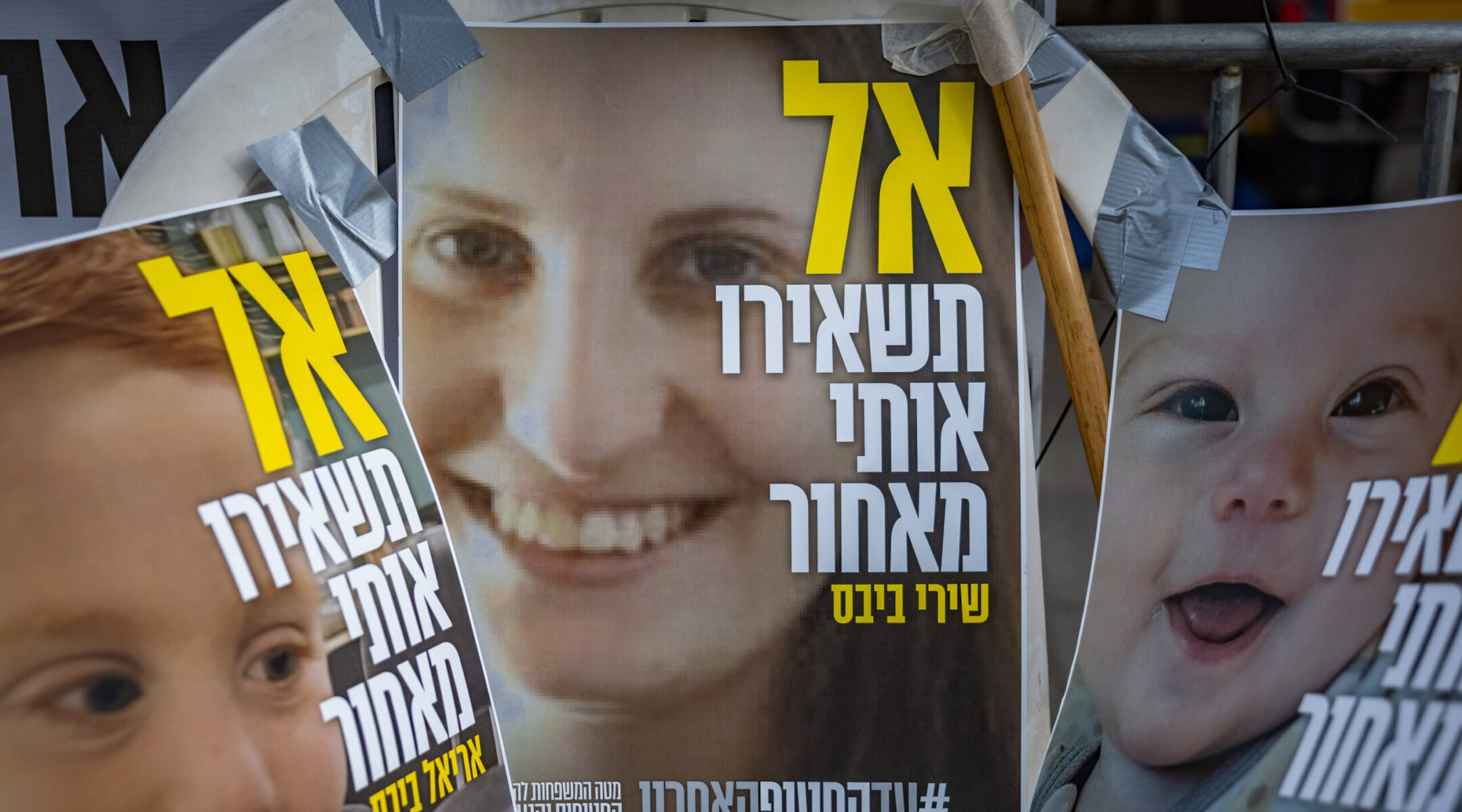Israel delays release of Palestinian prisoners, threatening ceasefire deal, after Shiri Bibas’ body returned
The delay followed Saturday’s release of six living hostages from Gaza, including two held for a decade

Pictures of Shiri Bibas and her children Kfir and Ariel who are held hostage in Hamas captivity hang outside the protest tent calling for the release of Israeli hostages in the Gaza Strip, outside the Prime Minister’s residence in Jerusalem, February 19, 2025. Photo by Chaim Goldberg/Flash90 *** Local Caption *** אריאל כפיר שירי ביבס בית ראש הממשלה משפחות חטופים מלחמה חרבות ברזל אוהל מחאה
Israel delayed the planned release of 600 Palestinian prisoners early Sunday, threatening the fragile ceasefire with Hamas after a tumultuous and emotional week regarding the return of several living and dead hostages from Gaza.
Prime Minister Benjamin Netanyahu’s office released a statement around 1 a.m. saying the delay was due to “ceremonies that demean our hostages’ dignity and the cynical use of our hostages for propaganda purposes” and referred to the prisoners as “terrorists.” The prisoners had already been loaded onto buses at Israel’s Ofer prison for what was the largest single-day release called for under the six-week first phase of the ceasefire deal.
The delay followed the return Saturday of six living Israeli hostages, including two — a Bedouin with developmental disabilities and an Ethiopian Jew — who had gone into Gaza on their own volition a decade ago. Also on Saturday, Israel confirmed that human remains handed over by Hamas the day before belonged to Shiri Bibas, the mother of the young redheaded boys Kfir and Ariel, who were all abducted from Kibbutz Nir Oz on Oct. 7, 2023, and later killed.
Outrage had erupted across Israel and the Jewish world when Hamas sent a coffin to Israel that it said contained the body of Shiri Bibas but which Israeli forensics analysis found was another woman’s; the terror group said the switch was made in error.
The six living hostages released Saturday are:
- Hisham Al-Sayed: Al-Sayed, 36, wandered into Gaza by foot in 2015. Last seen with an oxygen face mask in a propaganda video released in 2022, he was released to the Red Cross without ceremony in Gaza City.
- Eliyah Cohen: Cohen, 27, was one of four Nova festival-goers to emerge alive from a shelter where 16 others died. He was reportedly wounded on Oct. 7. His mother said earlier this month that previously released hostages said Cohen had been chained and beaten.
- Avera Mengistu: One of four hostages not taken on Oct. 7, Mengistu, an Ethiopian-Israeli, entered Gaza by foot in 2014.
- Omer Shem Tov: Taken hostage from the Nova music festival, Shem Tov, 22, was seen alive by hostages who were released in November 2023.
- Tal Shoham: Taken hostage from Kibbutz Beeri along with six members of his family, Shoham, 39, remained in captivity after his wife, children, and other relatives were released in November 2023. Several other family members were murdered on Oct. 7.
- Omer Wenkert: Abducted from the Nova music festival, Wenkert, 23, was seen alive in videos filmed by Hamas that day.
Hamas is due to release the remains of four other hostages in the coming week under the terms of the six-week ceasefire that it struck with Israel in January. But the fate of that deal, along with future phases, may be jeopardized by Israel’s delay of the prisoner release.
Ezzat El Rashq, a member of the Hamas political bureau, said in a statement that the “decision reflects a deliberate attempt to disrupt the agreement, represents a clear violation of its terms, and shows the occupation’s lack of reliability in implementing its obligations.” Another Hamas spokesman said Netanyahu was “deliberately stalling.”
The 620 prisoners slated for release on Saturday included men serving long sentences for killing Israelis as well as women and minors from Gaza arrested since the current war began.
The “humiliating ceremonies” the prime minister’s office referred to included raucous rallies in Gaza in which hostages were made to were fake military uniforms and Hamas members showcased their power.




















